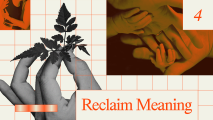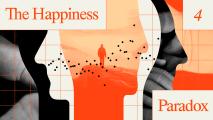By anyone’s standards, Charles is a high performer. After rising to top executive ranks at a much vaunted Silicon Valley company, he helped start another one and reached the top ranks there as well. But that’s not how Charles measures his own success. He has created a personalized Venn diagram for a meaningful life and his work is just one part of it. “It’s organized into three buckets,” he shared with us, “which are pursue passion, surround myself with people I love, and be grateful for the ride.”
Yes, the work he does matters, but the specifics of why it matters to him are important. “You have to commit yourself to purposeful work but it’s of no meaning if it’s not done in relationship with others,” he told us. “And if you’re not able to internally feel a sense of gratitude or appreciation for it or recognition of it, then that’s all for naught.”
We met Charles through our research on high performers, a project initially intended to better understand how certain people were able to be more effective at work, for a sustained period. We interviewed 300 people who had been designated as high performers by their organizations (an equal number of men and women, in organizations around the globe). One of the surprising insights of our research was how many of them were powder kegs of stress — without realizing it. We would be deep into our interview before they began to acknowledge that they were struggling to keep up with both work and their personal lives.
After decades of research, we were familiar with the kind of recognizable stress that high performers can endure to achieve their professional goals. But this was something completely different. What became clear as we talked is that it was never one big thing that led people to the feeling of being overwhelmed. Rather it was a relentless accumulation of unnoticed small stresses, in passing moments, that was so drastically affecting the well-being of these people who otherwise appeared to “have it all.” So we started to call this microstress.
Getting more material stuff makes you want more material stuff, what researchers call the hedonic treadmill.
But Charles is one of a handful of people we interviewed who seemed to manage and rise above microstress better than the rest of us — a group we began to call the “Ten Percenters.” One of the things the Ten Percenters have in common is their ability to find purpose in small moments in their work and personal lives. In a world where we are constantly bombarded by advertisements and social media influencers trying to convince us that happiness comes from material possessions and instant gratification, it is easy to lose sight of the importance of giving to others. But the Ten Percenters did not.
Hedonic vs. eudaimonic
Giving to others, even in small ways, can generate a palpable sense of purpose. And that’s not just because we’ve been taught that it’s the right thing to do. There’s actually a scientific explanation for why that happens. It’s rooted in the distinction that researchers often make between activities that are eudaimonic versus hedonic.
Eudaimonic (“eu” meaning good, and “daimon” meaning spirit or soul) activities are outwardly focused and include those in which we give of ourselves to others. The term comes from what Aristotle described as the “pursuit of virtue, excellence, and the best within us.” In contrast, hedonic (meaning “pleasure”) activities are focused inward and concerned with more momentary fulfillment. Getting the latest phone, splashing out on a gourmet meal, or winning a new sales contract may be hedonic activities. None of them are bad on their own. But when your life is dominated by the pursuit of hedonic rewards, you can start to make choices that will not lead you to happiness in the long run.
Emerging neurological evidence shows activities that transcend the hedonic, such as giving to others, lead to greater well-being over time. In one study, functional MRI scans were used to observe neurological activity in the reward center of the brain, the ventral striatum, when exposed to thoughts about either giving or receiving money. In some people, questions about giving money (for example: If you were giving money, who would you give it to and why?) stimulated high reward activity. In other people, questions about receiving money (for example: If you were to get money, what would you spend it on and why?) activated the brain’s reward center. But over time, an interesting patten emerged. When researchers measured depressive symptoms in each group one year later, they found that the participants whose brains had lit up from giving money experienced a decline in depressive symptoms, while the people whose brains rewarded them for receiving money showed an increase in depressive symptoms.
The simple act of asking someone to mentor you can boost the self-confidence of the person you’re asking.
In contrast, hedonic activities beget hedonic activities. Getting more material stuff makes you want more material stuff, what researchers call the hedonic treadmill. But the gains we feel from hedonic activity wash away quickly for two reasons: (1) Our rising aspirations mean we quickly become accustomed to our new clothes, car, house, phone, computer, and so forth and seek the “high” of getting the next item; and (2) social comparison keeps us on the lookout for what others have that we hedonistically want, whether it’s a big house, a desirable vacation, or getting interviews with top organizations.
Palpable sense of purpose
What was remarkable in our research was that though Ten Percenters have the material trappings of success — they are, after all, recognized by their companies as high performers and rewarded accordingly — it isn’t the focus of their identity. Instead, they have a sense of purpose in their lives separate from money or things or society’s expectations that helps them transcend the pressures of “hedonic” lifestyles.
When the high performers in our research spoke most passionately to us about their sources of purpose at work, it often involved a role they played in helping others. Giving can take many forms — acknowledgement of someone’s contribution, asking them how they are doing and meaning it, showing empathy, passing on a small note, or sharing an article. Even for young people who may not think they have much to give, the simple act of asking someone to mentor you can boost the self-confidence of the person you’re asking. Throughout our research, we found that too often people shut themselves off from the important benefits of giving because they weren’t creative or expansive in how they thought about what they had to give.
What we learned from the Ten Percenters was that giving to others, even in small ways, can generate a palpable sense of purpose. This is because activities that transcend the hedonic lead to greater well-being over time. While hedonic activities are not all bad, when our lives are dominated by them, we can start to make choices that will not lead to long-term happiness. By contrast, finding purpose, even in small moments in a routine day, can change not only how you feel about your job, it can change how you feel about your life.
This excerpt was reprinted with permission of Big Think, where it was originally published.






